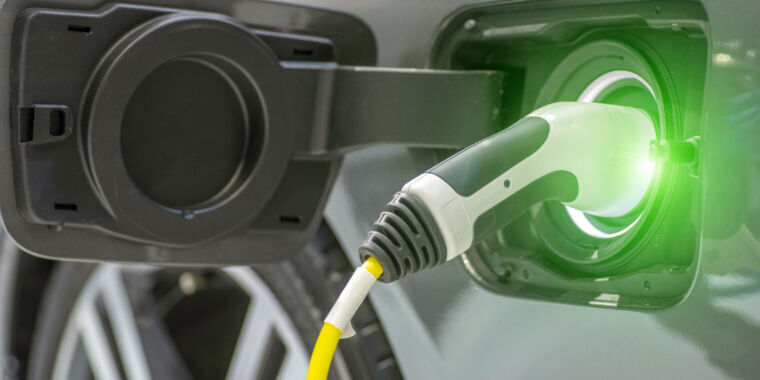Upgrading because EV need the power is looked at suspiciously. If an entrepreneur says he needs power for his factory and they’ll ask by what date he needs the lines.
It’s strange to see all this whining about electric cars from the US.
In the UK people have been charging cars at home, work, and at car parks for ages, and we’ve not heard the electric companies whining about infrastructure costs. They’ve been rubbing their hands at the thought of all that electricity they’re going to sell, and got the fuck on with it.
I suspect articles like this are just more pro-oil propaganda.
I read that there’s a huge backlog in the UK for new connections to the grid for solar farms because the infrastructure isn’t there due to a lack of investment. Sounds like the other side of the same coin.
It’s just that in America they realized if they complain enough, they get to rub they’re hands gleefully at the thought of all that electricity they’re going to sell, AND all the public money they’re going to get to upgrade the grid!
To be fair they are on a third world 110v electrical system which means they need twice the cable size to carry the same current as the UK
That’s not the only new kid on the block. AI and blockchain eat tons of electricity.
https://www.theverge.com/24066646/ai-electricity-energy-watts-generative-consumption
And according to this article the upgrades will happen and consumer’s electric bills will barely change:
At the same time, the costs will be spread out over decades and only total up to (at most) three times the grid’s annual operation and maintenance costs. So in any one year, the costs shouldn’t be crippling. All that might be expected to drive the cost of electricity up. But Li and Jenn suggest that the greater volume of electricity consumption will exert a downward pressure on prices (people will pay more overall but pay somewhat less per unit of electricity).
What’s the cost of not doing it in the long run?
The entirety of human civilization and a severe destabilization to all life on the planet.
This is why infrastructure should be nationalized, this should’ve been started a long time ago but that would impact shareholders and we just can’t have that, can we?
Hell no.
My state reps office told me we shouldn’t join the national grid because… " If another area has an emergency we’d have to share our power."
He basically wigged out when I said that’s fine, THAT’S THE POINT.
Edit for context this is in TX we basically have our own shitty grid for anyone not aware people froze to death in modern society when our grid failed…
They’re not actually worried about sharing power, they don’t want to be subject to additional federal regulation.
In this case, the issue is business interest in politics, not our weird toxic individualism.
Well and the “solution” touted by other offices was the setup a low interest loan getup for gas and oil to setup more power plants. You know, but not renewables.
The hand out is blatantly obvious.
Presumably your asshole rep is dead against this kind of thing?
“The gas and electric markets in Texas are lightly regulated and highly competitive, which has pushed companies to deliver energy at the lowest possible cost. But it also means that many companies were ill-prepared when the mercury dropped. To save money, they had skimped on winterizing their equipment. As a result, gas lines across the state—which has about 23 percent of the country’s reserves—quite literally froze. The spot price of natural gas soared to 70-times what it would normally be in Minnesota, and gas utilities paid a hefty premium when they used the daily market to match demand.”
Yeah, neat. Now pay for it & get it done.
So like, 3 months of PG&E bills?
this seems low, especially because in like 10 years it will cost like 100 billion
From the article…
The one wild card is direct current fast charging. Eliminating fast chargers entirely would reduce the number of feeders that need upgrades by 12 percent. Converting all public stations to DC fast charging, in contrast, would boost that number by 15 percent. So the details of the upgrades that will be needed will be very sensitive to the impatience of EV drivers.
And considering humanity is impatient, you might as well just assume the higher number.
Impatience wouldn’t make a difference if home charging was more widely available. New home construction to have charging requirements.
Homes with a garage should require at least 1 dedicated 50 amp circuit near a parking space. Apartment complexes should be required to install X number of chargers per unit. There are several options on the market to allow them to charge for the electricity on a per unit basis if utilities aren’t included in rent, or if they want to charge that separately.
Overnight charging doesn’t even need 50A L2. Less than half that is plenty for most users.
Chump change for us. Just do it.
It would be better with distributed generation like solar. The idea of a central generation point and transmitting it long distances is just not the best way (single point of failure/attack, losses of long distance transmission, often dirty and/or dangerous). Having lots of little solar farms all over (or even private) is better. I’d imagine most of Californians could provide their own EV needs if you have a large enough roof.
Take this with a grain of salt …. I’m not a power engineer but I did stay at a Holiday Inn Express last night.
Well just 5 years ago it would’ve cost just $5 billion.
19 billion in consulting fees.








